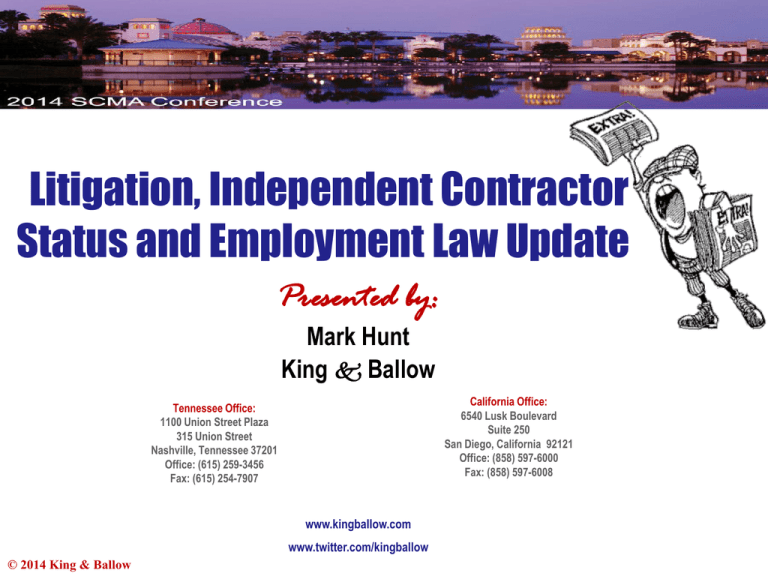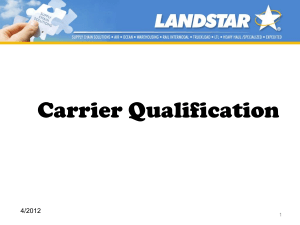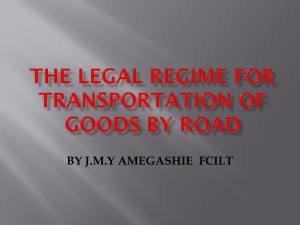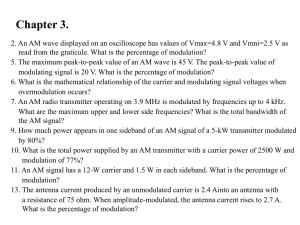Litigation, Independent Contractor Status & Employment Law Update
advertisement

Litigation, Independent Contractor Status and Employment Law Update Presented by: Mark Hunt King k Ballow California Office: 6540 Lusk Boulevard Suite 250 San Diego, California 92121 Office: (858) 597-6000 Fax: (858) 597-6008 Tennessee Office: 1100 Union Street Plaza 315 Union Street Nashville, Tennessee 37201 Office: (615) 259-3456 Fax: (615) 254-7907 www.kingballow.com www.twitter.com/kingballow © 2014 King & Ballow Litigation Update Espejo v. The Copley Press Espejo v. The Copley Press • This lawsuit was filed on January 29, 2009 by a group of newspaper carriers for the San Diego Union Tribune claiming they were misclassified as independent contractors. • A class of carriers was certified on September 21, 2011 and the parties engaged in discovery regarding the issues in the case for nearly 2 years. • The case was tried from May 29, 2013 until June 18, 2013. Espejo v. The Copley Press • The court rendered its decision on December 20, 2013 finding that the class of 1,235 carriers that delivered between January 29, 2005 and July 1, 2007 were employees of the Union Tribune and not independent contractors. • The court awarded $4,953,795 to the class of carriers as compensation for their unreimbursed expenses. • On January 21, 2014 the court awarded attorneys’ fees of $6,160,416 to the attorneys for the carriers, of which $1,250,000 would be paid out of the award to the class of carriers and the balance would be paid by the Union Tribune. • The parties are continuing to file motions and argue issues in the lower court and an appeal of the decision has been filed. Ayala v. Antelope Valley Newspapers, Inc. The Antelope Valley Newspapers Case • This case was filed in Los Angeles County in 2008 seeking certification of a class of home delivery carriers for the AVP. • The court denied certification based on the numerous variations in how the carriers performed their jobs. • The carriers appealed this decision to a Court of Appeals in California. The Antelope Valley Newspapers Case • A Mixed Result – the Court of Appeals reversed part of the lower court’s decision and affirmed part of that decision. • The Court found that the virtually identical contracts signed by carriers and uniform work policies constituted common evidence on the independent contractor issue. • Sent case back to lower court for certification on five of the carriers’ claims because of common proof on those claims. • Upheld denial of class certification on the following three claims because individualized testimony would be required: overtime; meal break; and rest break claims. • On January 30, 2013, the California Supreme Court granted a request to review the decision. •Oral argument was conducted before the California Supreme Court on April 3, 2014 and the case has been submitted for a decision. Sotelo v. Media News Group Sotelo v. Media News Group • This lawsuit was filed in 2006 and the plaintiffs sought certification of a class comprised of all distributors and carriers at all MNG properties in California. • The court denied class certification based in part on differences in contracts and business operations at the various MNG properties. • The plaintiffs appealed this decision to a Court of Appeals in California – not the same Court of Appeals as in the AVP case. Sotelo v. Media News Group • The Court of Appeals affirmed lower court’s denial of class certification for newspaper distributors and carriers. • The Court found the proposed class did not meet the “ascertainability” requirement for class certification. • Proposed class of 5,000 distributors and unknown number of newspaper carriers performing services under distributors was not easily ascertainable. • The Court also found that common questions of law and fact did not predominate over individualized questions. • Individualized testimony would be required on: overtime, meal break and rest break claims; fraud and concealment claims; and the independent contractor vs. employee issue. • California Supreme Court has denied a request to review the decision. Becerra v. McClatchy Company • Trial set for November 3, 2014 Dalton v. Lee Publications, Inc. • Trial set for August 11, 2014 Sawin v. McClatchy Company • Trial date currently being set Independent Contractor Status Update What is an Employee? An employee is subject to the will and control of the employer not only as to what shall be accomplished but also how it shall be accomplished. What is an Independent Contractor? One who… is engaged to perform services in accordance with his own methods of operating. remains free from the control and direction of the hiring party with respect to everything except the ultimate result sought to be achieved. “Employee” vs. “Independent Contractor” Courts and legislatures have not settled upon universally applicable standard for ascertaining status Certain tests must be satisfied Basic Test Right-To-Control Test Because newspaper carriers tend to work unsupervised and away from company facilities, it’s possible to design a distribution system that satisfies the tests for independent contractor status. Right-To-Control Test • The extent of control which, by the agreement, the company may exercise over the details of the work. • Whether or not the one employed is engaged in a distinct occupation or business. • The kind of occupation, with reference to whether, in the locality, the work is usually done under the direction of the employer or by a specialist without supervision. Right-To-Control Test • The skill required in the particular occupation. • Whether the employer or the workman supplies the instrumentalities, tools and the place of work for the person doing the work. • The length of time for which the person is employed. • The method of payment, whether by the time or by the job. Right-To-Control Test • Whether or not the work is a part of the regular business of the employer • Whether or not the parties believe they are creating the relation of master and servant Preventive Measures Have a Written Contract Which Contains: Statement of Intention to Create an Independent Contractor Relationship • Contract Should Expressly State that Carrier and Company Intend to Create an Independent Contractor Relationship Description of Who Controls What • Carrier Controls Methods and Means of Performance • Company Controls Only Result to be Achieved Description of Method of Payment • Payment by the Job Performed (e.g., per piece, buy/sell) • Not by Time Worked (e.g., per hour, monthly salary) Direct Seller Exemption • Component of the Small Business Job Protection Act (1996) Specifically includes persons who are “engaged in the trade or business of the delivering or distribution of newspapers or shopping news (including any services directly related to such trade or business)” • Requirements – 1) substantially all of the worker’s remuneration for the performance of such services must be directly related to sales or output, rather than the time or hours worked – 2) services must be performed pursuant to a written contract that states the carrier will not be treated as an employee for federal tax purposes Statement of Termination Rights of Parties • Don’t Use “At-Will” Employee Termination with Independent Contractors • Most Defensible is Contract for a Term (e.g., 1 year)- with Termination During 1 year Term Only for Breach • If Using “Without Cause” Termination Provision- Provide Carrier with Advance Written Notice Period for Termination (e.g., 30 days notice) Statement of Who Pays for What • Carrier Should Provide and Pay for All Tools and Equipment • If Company Provides Materials, Tools or Equipment to Carrier- Carrier Should be Charged for Same • Carrier Should Pay all Expenses Related to PerformanceCompany Should not Reimburse Carrier for Expenses Statement that Carrier’s Personal Services are not Required • Provide that Carrier May Use Substitutes or Helpers • Carrier Should Select, Control and Pay Substitutes or Helpers • Company Should not Have Veto Power over Substitutes or Helpers Used by Carrier Miscellaneous Provisions • Provision that Carrier will not Receive Benefits Provided by Company to its Employees • Statement Allowing Carrier to Provide Similar Services to Other Companies Miscellaneous Provisions • Include Language in Contract Needed to Qualify for any “Industry Specific Exemptions” Live by the Written Contract Live by the Written Contract • Managers Must Know Proper Treatment to Maintain Independent Contractor Relationship- Can “Make or Break” Independent Contractor Status • Avoid or Reduce Use of Written Materials with Carrier’s Apart from Written Contract – Other Materials may Contradict Written Contract- Every E-mail, Memo or Note from a Manager is an Opportunity for Control • Avoid Using Human Resources Department with Independent Contractors (e.g., Don’t Use an “Employment Application”, with Independent Contractors- No W-2/ W-4, Instead Use W-9/1099) Live by the Written Contract • Language Matters with Independent Contractors (e.g., Employees are “Hired” and “Fired”; Independent Contractors are “Contracted” and “Terminated”) Responding to Carrier Needs Without Compromising Independent Contractor Status • New Carrier Orientation • Writing E-mails or Memos to Carriers • Carrier Meetings • Bonuses and Carrier Recognition • Fluctuating Gasoline Prices • Covering Routes in Emergencies • Carrier/Subscriber Contact New Carrier Orientation New Carrier Orientation • Terminology • Outgoing Contractor Whenever Possible • If the DM has to do it, you are vulnerable, so emphasize carrier choice. Writing E-mails or Memos to Carriers Memo Writing E-mails or Memos to Carriers • The source of the most damage to a newspaper’s IC argument. • Avoid orders and instructions unless it’s a direct reference to the written contract. • Suggestions are OK, but use clear suggestion language. • When you have to correct unacceptable performance, tie it back to the contract. Carrier Meetings Carrier Meetings • Voluntary and informational • Benefits of having one or two who will not attend Bonuses and Carrier Recognition Bonuses and Carrier Recognition • Can be OK, but there are pitfalls to avoid • Carrier recognition should avoid tying the carrier too closely to the newspaper Fluctuating Gas Prices Fluctuating Gas Prices • A legitimate concern that comes and goes • Use a contract addendum to adjust compensation on a temporary basis Covering Routes in Emergencies Covering Routes in Emergencies • OK if it’s a real emergency, but the carrier must still be charged • If it’s ongoing, it’s going to come back to haunt you • The DM should never allow self to be viewed by the carrier as a potential substitute Carrier/Subscriber Contact Carrier/Subscriber Contact • As a general rule, don’t restrict unless customers are complaining about it • OK for subscribers to have a communication option, if the carrier wants to provide one. Manage With a Soft Touch • Administer the contract-not your personal preferences • Be a resource-not a boss Employment Law Update Title VII Update- Employer Vicarious Liability • Vance v. Ball State decided by United States Supreme Court June 24, 2013 • When is an Employer responsible for the discriminatory actions of a “supervisor”? • Title VII imposes liability in two instances; 1. If the employee is a supervisor; 2. If the employer is made aware of an offending worker’s conduct and fails to take action to remedy the behavior. Supreme Court Held • A “supervisor” is one with the power to make tangible employment decisions or take action against the victim. • An employer may be vicariously liable for a supervisor's unlawful harassment only when the employer has empowered that individual to take tangible employment action against the victim. • Meaning the offending individual has the ability to effect a significant change in employment status, such as hiring, firing, failing to promote, reassignment with significantly different responsibilities, or a decision causing a significant change in benefits. National Labor Relations Act Update • The National Labor Relations Board (NLRB) is currently considering whether employees have a federal right to use their employer’s e-mail systems for Section 7 purposes such as: – – – – for union organizing to discuss wages to discuss discipline and to discuss other protected activity • This decision will impact all employers whether their workers are unionized or not National Labor Relations Act Update • Since the Register Guard decision in 2011 employers have been able to enforce electronic use policies prohibiting employees from this type of use of the employer’s systems • The NLRB has now invited briefs in the case of Purple Communications, Inc. to determine if it should overrule the 2011 Register Guard decision. • The briefs are to address the following questions: 1. Should the NLRB reconsider its conclusion in Register Guard that employees do not have a statutory right to use their employer’s e-mail system (or other electronic communications systems) for Section 7 purposes? 2. If the NLRB overrules Register Guard, what standard(s) of employee access to the employer’s electronic communications systems should be established? What restrictions, if any, may an employer place on such access, and what factors are relevant to such restrictions? National Labor Relations Act Update 3. In deciding the above questions, to what extent and how should the impact on the employer of employees’ use of an employer’s electronic communications technology affect the issue? 4. Do employee personal electronic devices (e.g., phones, tablets), social media accounts, and/or personal email accounts affect the proper balance to be struck between employers’ rights and employees’ Section 7 rights to communicate about work related matters? If so, how? 5. Identify any other technological issues concerning e-mail or other electronic communications systems that the NLRB should consider in answering the foregoing questions, including any relevant changes that may have occurred in electronic communications technology since Register Guard was decided. How should these affect the NLRB’s decision? Questions and Answers








